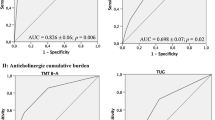Abstract.
Objective: The association between cognitive impairment and compliance with prescribed medications was investigated among functionally independent Japanese elderly in the community. Subjects: The subjects of this study were 220 elderly persons aged 60 years and over, who lived in the community. All participants were taking a regimen of one or more prescribed drugs. We included elderly with mild to moderate cognitive impairment. Medication use was observed by pharmacist-conducted interviews during home visits. Compliance was estimated by the pill count method. The Mini-Mental State Examination (MMSE) was used to estimate cognitive function. Results: The mean age (SD) of the subjects was 75.7 (6.9) years. Of the subjects, 58 (26.4%) were cognitively impaired (MMSE≤23), and 76 (34.6%) exhibited poor compliance (rate of compliance<80%). Poor compliance was associated with the subjects who had a lower education level, had lower MMSE scores, had concern about taking drugs, who intentionally self-selected (intentional noncompliance) prescribed drugs, had a poor relationship with a physician, who did not have one dose package, and those who did not use a medical calendar. In multiple logistic regression analyses, intentional noncompliance (OR 19.65, 95%, CI 9.22–41.92; OR, odds ratio; CI, confidence interval), cognitive impairment (MMSE≤23; OR 2.94, 95%, CI 1.32–6.58), and a poor relationship with a physician (OR 6.24, 95%, CI 1.55–25.20) were independent predictors of poor compliance for elderly in the community. Conclusion: We found that cognitive impairment was one of the predictors for poor compliance among the elderly who are functionally independent in the community. Intentional noncompliance was the strongest predictor for poor compliance, which was influenced by the relationship between patient and physician. Physicians should establish good communication with their elderly patients and provide some support to compensate for cognitive impairment.
Similar content being viewed by others
Author information
Authors and Affiliations
Additional information
Accepted in revised form: 26 June 2001
Electronic Publication
Rights and permissions
About this article
Cite this article
Okuno, J., Yanagi, H. & Tomura, S. Is cognitive impairment a risk factor for poor compliance among Japanese elderly in the community?. Eur J Clin Pharmacol 57, 589–594 (2001). https://doi.org/10.1007/s002280100347
Received:
Issue Date:
DOI: https://doi.org/10.1007/s002280100347




